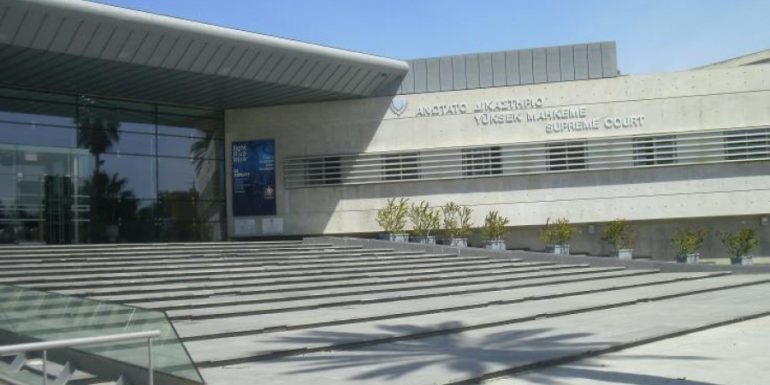The Supreme Court rejected an application for permission to register a request for annulment of Certiorari and Prohibition in relation to three decrees issued recently by the Nicosia District Court in a lawsuit filed by former Speaker Dimitris Syllouris against Al Jazeera and six other natural persons, referring to have at their disposal.
According to the facts as set out in the decision of the Supreme Court dated 8 July, “the claim of the Defendant is the Request for a statement of the Court that the publication of a specific video on 26.10.2019 concerning him, without his consent, constitutes an illegal act violating his constitutional rights. A decree is claimed in this regard, which prohibits them from using the specific videotape in any way and compensation for defamation ".
On the same day, it is reported, "upon the filing of the lawsuit, the Defendant filed the Application with the lower Court with a unilateral application and on 20.5.2021 secured a temporary decree prohibiting the Applicants from using or disposing of this video without his consent" .
"Despite the fact that, as stated in the affidavit in support of the application itself, the videotape had started airing nationwide since October 2020, it was judged that the element of urgency was satisfied, since the videotape was nominated for an award in the category 'Current Affairs "By the BAFTA organization, which would take place on 6.6.2021 and would be screened", it is added.
The interim decree, the Supreme continues in its decision, was "appointed" for service "on 18.6.2021, without mentioning that it was reimbursable that day. The day after the issuance of the decree, the Defendant re-applied to the lower Court and on 25.5.2021 secured a decree for the service of the summons, the application for the interim decree and the decree itself on 20.5.2021 to Applicants in England ".
It is noted that the decree allowing the service was issued on 27.5.2021, however the documents to be served were delivered to the couriers (DHL) on 14.6.2021, as shown in the relevant forms. After all, the relevant
cover letter of the Defendant's lawyer the Application is dated 11.6.2021.
"The documents to be served were left at the address given by the Defendant in London on 15.6.2021, ie only three days before the date on which the application was scheduled. "They were not handed over to the Applicants personally and it is not clear whether they ended up with any of them", it is reported.
"The Applicants did not appear before the lower Court on 18.6.2021. In the minutes dated 18.6.2021 (Item 10A) it is recorded that the service was proved to the Applicants who were absent. The lower Court noted that the service to them was correct and in accordance with the issued decree and proceeded to the finalization of the interim decree dated 20.5.2021 in their absence ", it is added.
This, according to the Supreme Court, "shows that the lower Court considered that the interim injunction was reversible that day, despite the fact that it was not mentioned in the minutes of 20.5.2021 that it had been so determined".
"By considering the service on 15.6.2021 normal, the lower Court, as it appears at first sight, considered that the Applicants had been duly notified and if they did not appear they could proceed in their absence as it did", the decision of the Supreme Court states .
However, it is added, "the service made on 15.6.2021 could not have been lawful in respect of a procedure set on 18.6.2021,1 unless the lower Court itself had ordered the shortening of the time for service, 2 which but that was not the case. "
It is noted that the delivery took place on 15.6.2021 does not result from the minutes of the lower Court itself dated 18.6.2021, but from the testimony offered by the Applicants.
The Supreme Court finds "at first sight, a violation of the principles of natural justice".
It arises, however, it is noted, "the question is whether the Applicants have at their disposal another remedy and specifically the possibility to appeal to the lower Court for the set aside of the decree dated 18.6.2021 under D.48, i.8 (4) of the Institutions of Civil Procedure which provides that: "Any person (other than the applicant) who is affected by an order issued unilaterally may apply for a set aside or amendment της".
This, it is stated, "since according to settled case law of the Supreme Court, permission to register an application for a preferential warrant is granted only when the applicant demonstrates that there is, in essence, a debatable issue and, further, in the case where another remedy is offered or other treatment, that there are sufficiently exceptional circumstances to make it debatable that a derogation should be made from the rule that, if another remedy or other treatment is offered, the applicant is not considered to have proved a debatable issue '.
Elsewhere in its decision, the Supreme Court states that "in an attempt to highlight the exceptional circumstances, the Applicants again referred to the alleged errors of the lower Court, noting that the injunction effectively ordered the silencing of a world-renowned international international image of the Republic and the justice of the country ".
However, as it is held, "the Court is not satisfied that the prohibition decree has such implications that it is based on exceptional circumstances".
"The Applicants failed to distinguish their case from those cases for which the procedure of D.48, i.8 (4) was provided", it is noted.
